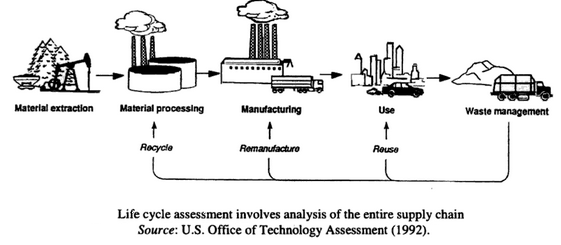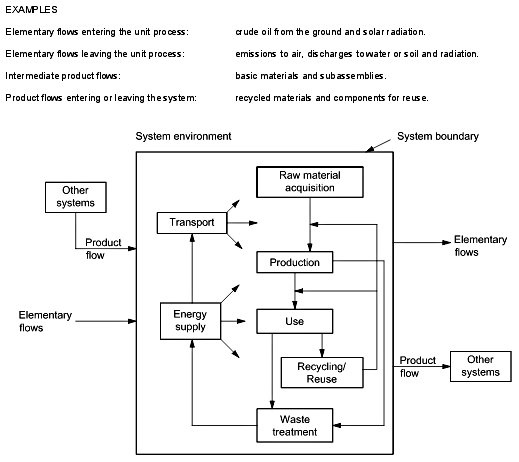- Life Cycle Assessment
- Life Cycle, you say? It simply means the events occurring from cradle to tomb. This is the trivial understanding of the human life cycle. And yet, most people tend to envision themselves as the inheritors of their predecessors' predispositions, qualities and even physical attributes. They talk of ancestry and hereditary. In a similar manner, most people crave for some sort of surrogate eternity, either by simply leaving descendants to perpetuate the lineage, or by legating a worthy bestowal to their surviving human fellows. This is enough foundation to claim that an individual's life cycle starts before the date appearing in the birth certificate, and lasts beyond the date of the person's death.
-
- The same reasoning applies to any product, merchandise or service. Its life cycle starts long before it becomes a finished product, and extends much after its usage ends. Upstream, it may encompass the first rough sketch jotted down by the engineer, or the collection or fabrication of the materials and parts required to build it. Downstream, it may spread over its collection after it has been discarded as waste, and its disposal by destruction or recycling.
-
- The life cycle concept proved priceless to handle various economical analyses, such as estimating the cost of ownership of a given asset, say a home or a car, or planning a new product, say a washing machine, or choosing between hiring an employee or delegating the job to a contractor.
-
- As we become increasingly aware of the impacts of both manufactured and consumed products on natural resources and the environment at large, the technique of life cycle assessment imposes itself as an efficient tool to comprehend, evaluate and address those issues. It is only logical that the international standard-setting ISO (International Organization for Standardization) developed a set of guidelines to systematize the life cycle assessment (LCA) process. The following are extracted from ISO standard 14040:
- Life cycle: consecutive and interlinked stages of a product system, from raw material acquisition or generation from natural resources to final disposal.
- Life cycle assessment LCA: compilation and evaluation of the inputs, outputs and the potential environmental impacts of a product system throughout its life cycle. LCA assesses, in a systematic way, the environmental aspects and impacts of product systems, from raw material acquisition to final disposal. LCA typically does not address the economic or social aspects of a product.
-
- Life cycle phases
-

-
-
- Example of a product system (ISO 14040)
-

-
Source: Life cycle assessment - Principles and framework, ISO 14040

